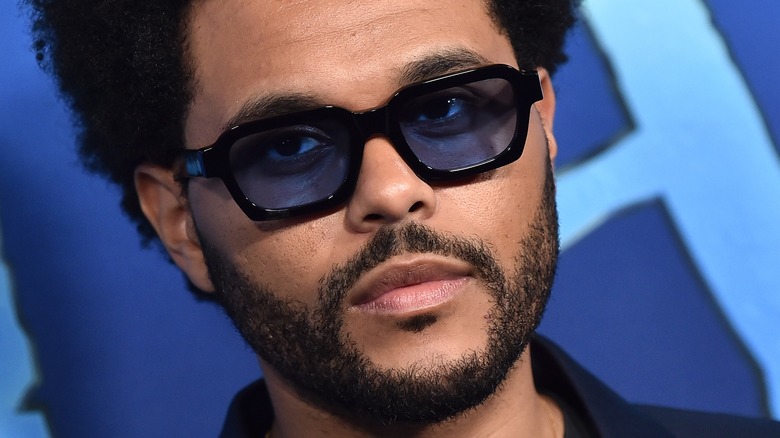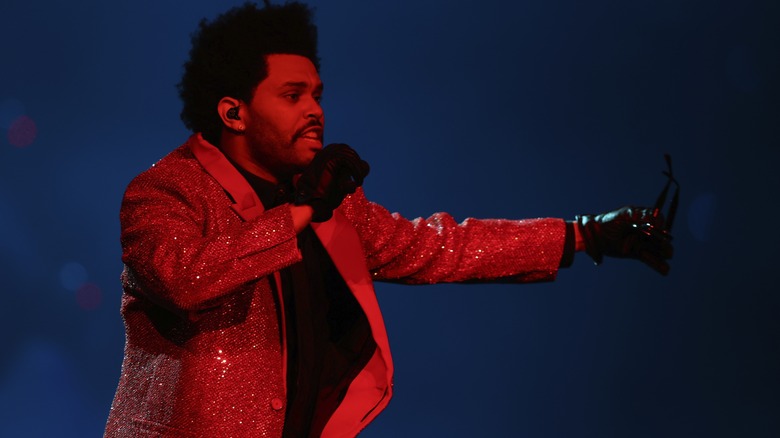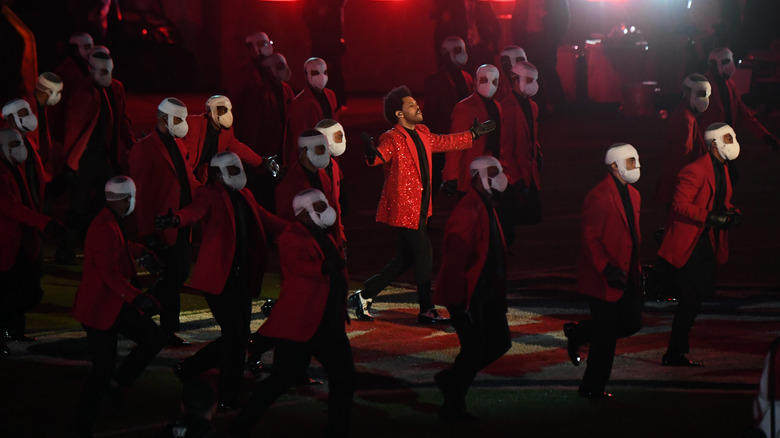Why The Weeknd Didn't Get A Paycheck For His Super Bowl Halftime Show
The Philadelphia Eagles and the Kansas City Chiefs are set to face off in Glendale, Arizona for Super Bowl LVII. But fans are excited to see more than touchdowns when Rihanna takes the stage to perform at halftime. "I'm nervous ... but I'm excited," the hitmaker told TMZ when she was stopped by paps in October 2022. She might be known as badgalriri, but we'd be surprised if she wasn't nervous. An estimated 36 million people tuned in for the 2022 Super Bowl Halftime Show, featuring Dr. Dre, Snoop Dogg, Mary J. Blige, Kendrick Lamar, and Eminem. These numbers were up from the reported 29 million households who watched The Weeknd's performance in 2021, per Fierce Video.
The Weeknd's show was something of an anomaly, given it took place in the middle of the Covid pandemic. The unique experience featured a "stage within a stadium," dancers in facial bandages, a backstage maze of lights and mirrors, and of course, some killer hits. "Instead of focusing on what we can't do [due to the pandemic] it's like, look at what the opportunities are because of the cards we've been dealt," executive producer Jesse Collins told ET. "The key word is 'live,' like, we didn't go pre-tape this ... It's all happening in that stadium, in that moment." So, with such a massive audience, and such an incredible set, would it be safe to assume The Weeknd drew in a hefty paycheck for his performance? Not exactly.
The Super Bowl Halftime Show provides a massive platform for artists
According to Forbes, The Weeknd did not get paid to perform at Super Bowl LV. This wasn't a slight against the musician; per Yahoo!, the NFL does not compensate its performers, though the league does "help cover production costs" up to a certain amount. Clearly, The Weeknd — who'd skipped out on the Grammy's in 2020 — felt he had a lot to prove because he contributed $7 million of his own to ensure his performance was a success. Per SCMP, it's estimated that The Weeknd's show could have cost as much as $17 million, which is a lot for just 10-12 minutes of airtime. However, a bigger, glitzier performance meant more interest in his "After Hours" tour, for which tickets went on sale just one day after the Super Bowl. Coincidence? Probably not.
It's true that any artist will jump at the chance to perform at the Super Bowl Halftime Show, given the amount of exposure it provides. As Forbes noted, Super Bowl alums generate more StubHub traffic — for example, Maroon 5's gross ticket sales (per city) jumped from $200K to $1.7 million after the group appeared at Super Bowl LIII. Likewise, when Justin Timberlake performed at the Super Bowl in 2018, his music sales increased by 534% that same day. Therefore, it's worth foregoing pay (and even chipping in money of your own) to profit off the huge spikes in social media and streaming that the Super Bowl provides.
Not all dancers who appear in the halftime show are paid
The stars of the Super Bowl Halftime show might be happy to perform for free, but what about all the backup dancers and volunteers who contribute their blood, sweat, and tears? In 2022, Page Six reported that production reached out to professional dancers, asking them to "volunteer" at the Super Bowl for free. "What is not common is a coordinator ... reaching out to professional talent to hire them as volunteers and working them for the amount of time that they are requesting," dancer Taja Riley told the outlet, condemning recruiters for working these volunteers up to nine hours a day, all for no pay.
Not all the dancers in The Weeknd's show were paid. Some turned in 60 hours of work in exchange for a red suit and face bandages, per LA Times. The paid dancers weren't aware this was happening at first, according to Devyck Bull, who told the outlet, "We had no idea that people were doing the same things as us but not getting paid. We thought they were nondancers." Keenan Williams, who was a part of The Weeknd's nonpaid team, explained to Page Six, "As artists, we have to have self-worth and a price for ourselves. Exposure doesn't pay bills, and it is frustrating."
In other words, performing for next to nothing is one thing if you're a multi-millionaire like The Weeknd. It's quite another if you're a dancer just trying to make a living.



